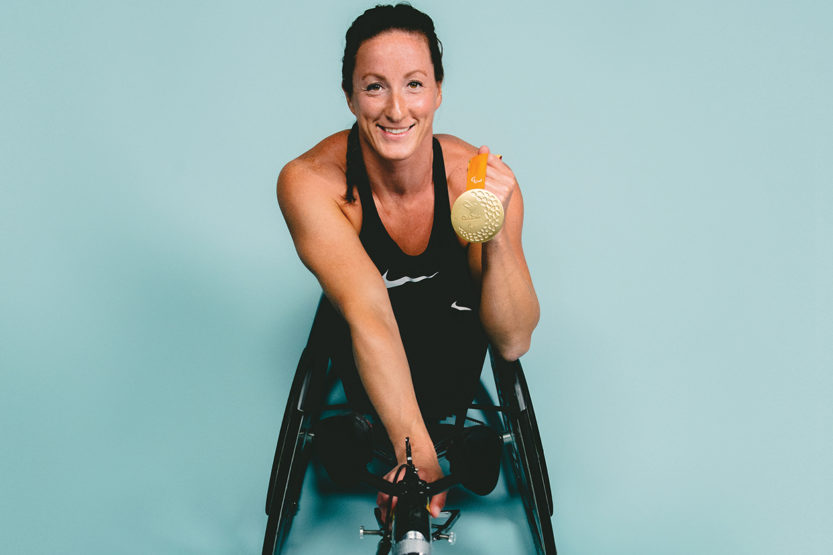Alumni Interview: Tatyana McFadden
 “Sometimes people look at disability as not a good thing. But I’m proud of having a disability,” says Tatyana McFadden, ’13 ACES. “It’s made me who I am today. It’s allowed me to travel the world, to be the best Paralympic athlete and marathoner.” (Image by Matt Winkelmeyer/Getty Images)
“Sometimes people look at disability as not a good thing. But I’m proud of having a disability,” says Tatyana McFadden, ’13 ACES. “It’s made me who I am today. It’s allowed me to travel the world, to be the best Paralympic athlete and marathoner.” (Image by Matt Winkelmeyer/Getty Images) I was born in St. Petersburg, Russia, with spina bifida. My birth mom couldn’t afford to take care of me, so I lived in an orphanage for six years without medical treatment, a wheelchair or education. It was a miracle I survived.
I came to the U.S. with Deborah McFadden, who adopted me in 1994. I was sick and anemic. Doctors said, “It’s going to be a hard life.” My parents thought otherwise. They placed me in sports immediately. I couldn’t catch; basketballs were hitting my face. I wasn’t even good at wheelchair racing. But I was enjoying it and getting stronger and healthier.
In eighth grade, I knew I wanted to be an Olympic athlete. I was 14 when I went to my first Paralympic Trials, and made it. I went to the Games in Athens. I won a silver and a bronze medal. I had an idol, Chantal Petitclerc, who was working to change the sport of wheelchair racing for Team Canada. I wanted to do the same thing for Team USA, to push the boundaries and raise awareness of the sport.
Tatyana’s Law is the result of what happened to me after Athens: I was denied access to participate in track. It wasn’t a tryout team, but I was denied a uniform and the right to race. My mom and I filed a lawsuit, not for damages, but for the right of people with physical disabilities to participate. It was one of the hardest battles I went through, but it taught me lifelong lessons.
A few of the athletes who qualified for the Paralympics were training at Illinois and I went to summer camps there. I knew it was the program to go to. It’s also a great place to get your education.
Illini Coach Adam Bleakney, BA ’00 LAS, MS ’02 MEDIA, convinced me to do my first marathon. At first, I was like, “No thanks, I’m a sprinter.” He told me to think of the marathon as doing the 400 meter about 100 times. My body was so equipped to do sprinting that it really did take me a full year to train for the 2009 Chicago Marathon. And then I won—because of my sprinting ability.
I told my sponsor, BP, about my dream to make the UI training center the Paralympic training center. We could expand the program and improve the technology. Racing chairs and gloves and tires—we wheelchair athletes need help to stay on top of our game. BP agreed. It’s nice when an Olympic sponsor steps up and believes in our dreams.
As a freshman, I remember training in a really small locker room. All of us were hitting elbows and taking turns on four rollers [indoor training cycles for wheelchair racers]. Now we have 12 rollers; each is hooked up to an iPad where we can simulate hill-climbing and descending. We have a completely accessible gym to work on our upper body strength.
It really says something about the program when, in Rio, based on the number of medals UI won, we would have come in fifth overall if we were a country.
It really says something about the program when, in Rio, based on the number of medals UI won, we would have come in fifth overall if we were a country. We’ve had athletes from other countries—Japan, Spain, Ireland, Scotland, Australia—come and learn from our program.
Here at Illinois, you train with world-class athletes every day, like Amanda McGrory, ’10 LAS, MS ’12 LIS, a reigning marathon champion and a medalist from the Games, too. It pushes me to be a better athlete. It’s also family, people to fall back on when things are good or bad. We have a special bond. So many athletes before me have done wonderful things for our sport. I feel it’s my responsibility to continue that. A lot of progress has been made. Paralympic athletes are now paid as much as Olympic athletes. Equality is coming. I hope to be marathoning for a long time so I can see it happen.
I’ll be completing my graduate degree this year. I’ll keep training, public speaking and working with my foundation, the Tatyana McFadden Foundation. I was in a Nike ad displayed during the Bank of America Chicago Marathon, and that ad has been a game-changer, bringing the marathon community that much closer. People with physical disabilities are relatable to society. We deal with challenges every day, but we’re pushing our sport to the limit, following our dreams and sharing our stories. Hopefully, we will touch someone’s life in helping them through their own challenges.

